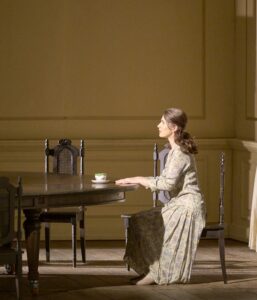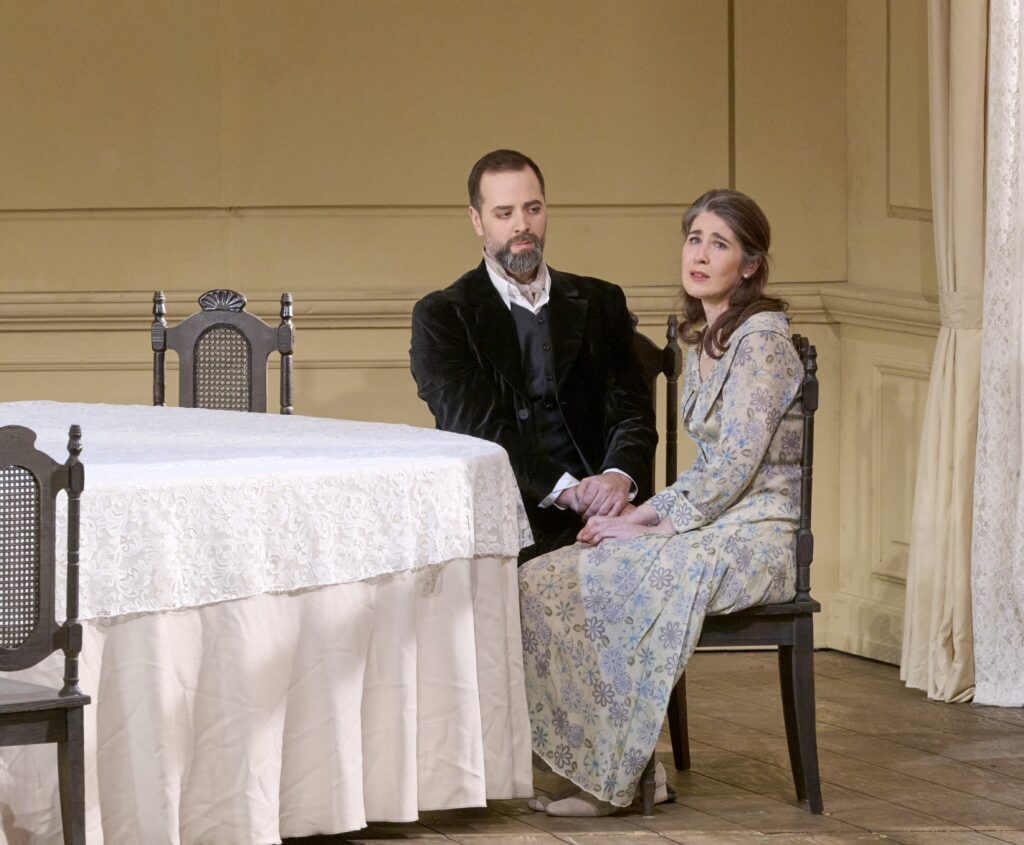Two mothers are lamenting the passing of time. ‘In those days you were still young, then suddenly you were married.’ Elena Manistina’s Larina, and Fillipevna (Elena Zaremba), Tatyana’s nurse, sing to Tchaikovky’s haunting elegies. But, Larina consoles, ‘Habit is a gift from heaven, a substitute for happiness.’ A premonition of Tatyana’s possible fate in this backwater. Then (Vienna State Opera’s) authentic, Russian-sounding choirs sing folk songs, ‘My ardent heart is aching’, evoking the underlying melancholy.
Not the boisterous guests, under a gold chandelier, behind them elaborately carved oak cabinet with the family’s fine china. Tatyana (Australian soprano Nicole Car), sings how she loves to hear these songs: they take her to far-off places. Tatyana is always dreaming; she sighs as if her heart would break.
‘Why when life is so full of happiness?’ Olga, her sister, Tatyana’s very opposite, is ‘exhuberant, carefree, cheerful’. Maria Barakova’s Olga is bosomy, blonde and flirty. Whereas (Larina comments), Tatyana always looks pale, as she sinks into her books.
Lensky, short, black-haired, (tenor Ivan Ayon Rivas), precedes his friend Onegin’s much-anticipated arrival. Onegin (Etienne Dupuis) towers over him, head-and-shoulders. But Dupuis’ Onegin looks rather severe, like an academic, with clipped beard. Onegin, haughty, walks around the table frowning, while Lensky, the idealist, a poet, is sociable, effusively happy.
‘Tell me, is it not terribly boring, living in the country?’, Onegin approaches Tatyana. She replies, reading provides her with an interest. He sees she’s an incurable romantic. He sings, he was one too.
Lensky stands declaiming his love for Olga: she captivated him from his childhood. She laughs, he loves her as only a poet can. Rivas’ splendid tenor earnestly sings her praises. Whereas Olga doesn’t quite take him seriously. There’s a strange imbalance between the slight Lensky and Barakova’s very fulsome Olga.
In Scene 2, the dining room’s lights are dimmed. But Tatyana is sitting alone on the long dining table. Filipina tells her it’s late for mass. (Imagine today’s romantic heroine, after midnight, scrolling on her phone?) She can’t sleep, it’s so oppressive. She’s bored; asks Filipina to talk about the old days, now forgotten. But we didn’t talk about love then. It was Gd’s will; the matchmakers haggled. But Tatyana’s suffered for two weeks, consumed with longing. I am not ill, I AM IN LOVE, she sings. (Leave me now!)
Car’s long-haired brunette, in her floral night-dress. Intensely emotional, yet captivating; her voice always interesting. Tchaikovsky’s music is aching with unspent passion. Then, defiantly, it may be her undoing, but she’s consumed with hope. She wants to feel bliss. (Car swoons ecstatically.) Then moves to the table, somehow finds her writing things. She’s on fire. But can’t think how to start.
Dawn breaks. Filippevna, still worried about Tatyana, sings ‘her cheeks are now as red as poppies.’ Brilliant white light bathes the table. The two high windows show green fields outside. Servants run in-and-out laughing. (Tatyana’s still in her nighthgown?) She’s suffering in her small corner. ‘Dear God how miserable I am.’ She hears steps: It’s him!
As Onegin, Dupuis’ rich sonorous baritone, very adequate, but lacking the tingle factor. However, I have not come to scold you, he sings, like a schoolmaster. He will make a frank confession. – She sings, aside, How excrutiating!
If he wanted to spend his life surrounded by family, I would choose no other bride but you! But he’s not made for that purpose. Believe me, such a marriage would be torment for both.
(Is he gay?) He ‘loves her as a brother would; or perhaps more.’ Then a put-down, it happens not infrequently that the dreams of your age end in disappointment. (OUCH!) He’s sitting next to her like an analyst. (But Onegin, himself unable to settle down, aloof, suppressing emotion, seems incapable of love.
Magnificent contrast -in Cherniakov’s production- after the gloomy introspection, the high-spirited family gathering. It’s Tatyana’s NAME DAY (birthday.) They bring in the cake. And the exhuberance of the family gathering only isolates her more, her shame of rejection. Olga’s bouncy, (Barakova in apple-green frock), while Lensky’s morose. Onegin greets Tatyana, and leaves her. Onegin purposely flirts with Lensky’s bethrothed out of spite. Dupuis’ Onegin whisks her across the room. Marvelous choreography of the dancing revellers. Lensky reproaches Onegin: how cruel you are. She’s danced every ecossais with you.
Lensky’s, like jilted Tatyana, misunderstood, the outsider. He thinks Olga doesn’t love him anymore. She, how strange you are! Lensky plays the clown, upturns chairs. Now picture Tatyana, raised up, on a plinth, overlooking the pile of gift-wrapped presents. But with a blank expression, as Lensky is on his knees in a party hat. They’re all circling the table in a conga.  And, in the confusion, a pile of his poems, scattered on the floor. Lensky charges Onegin with playing with a young girl’s emotions. Onegin, you are no longer my friend! I despise you!
And, in the confusion, a pile of his poems, scattered on the floor. Lensky charges Onegin with playing with a young girl’s emotions. Onegin, you are no longer my friend! I despise you!
While the partygoers, still in fun mood, think it’s all a joke, intended. Tragi-comic, it could be Chekhov (Uncle Vanya). Lensky, insulted over Olga, demands satisfaction. Larina demands silence. In our home!
Lensky, in his moving aria, recalls his happy days with them. Car’s Tatyana sings emotionally, this sorrow is breaking her heart. Lensky’s scorned by ‘deceitful’ Olga, who ridicules him.
In the duel Lensky brandishes a shotgun. It recalls Vanya, but in Chekhov, duels fizzle-out in farce. Lensky’s farewell aria is sung with pathos and power by Rivas, How far away you are my dreams of youth. Shall I survive the day dawning? Ironically, a servant collects his scattered manuscripts. And the memory of the young poet will fade. Plaintively he calls for his bethrothed, but Olga floats past in disgust.
Act 3, Polonaise, the oval table, now bedecked with silver-wear, the wall panels in cherrywood opulence. Under massive chandeliers, waiters dispense champagne. Onegin hovers like a dilettante. In his powerful aria, ‘All the pleasures of the world cannot alleviate his torment.’ He sings of killing time in indolence, boredom drawing him restlessly to new places. Dupuis’s Onegin, louche in gold moire smoking jacket. Tatyana, accompanied, wears a glittering silver gown, adorned with a diamond necklace, Car’s hair now elegantly coiffed. Prince Gremin (Dimitry Ivashchenko) introduces the astonished Onegin to his wife of two years. In Gremin’s wonderful aria, love, wasted on youth, is bestowed on all ages. He loves Tatyana beyond words. Tatanya greets Onegin- pleased to meet him, but we’ve met before. – He muses, is this the same Tatyana I lectured on principles? What he feels, may be his undoing.
They’re sitting, head of table, she sings, leaning on his shoulder – ‘With his burning eyes, he’s ‘disquieted her heart’, as if she’s a young girl again. But she must speak to him frankly. A simple girl’s love was nothing new for him. You didn’t find me attractive then, why are you pursuing me? Because her husband’s favoured at court? (They’re now facing opposite the long table,) ‘Happiness was within reach, bliss so close. But now she’s married, he must leave. He begs her. She won’t pretend: she loves him. But nothing can bring back the past; she’s loyal to her husband.
Onegin trails her, insistently; then on his knees, grovelling. Finally he takes out a revolver. The climax is a little disappointing from Dupuis. The scene, in its bathos, should move, as Tchaikovsky’s score does (Hanus conducting Vienna’s forces.) Praise for Cherniakov’s simple, but beautiful sets, and period costumes (Maria Danilova.) © P.R. 14.3.2023
Photos: Nicole Car (Tatyana); Ivan Ayon Rivas (Lensky); Étienne Dupuis (Onegin)
© Michael Pöhn/ Wiener Staatsoper

